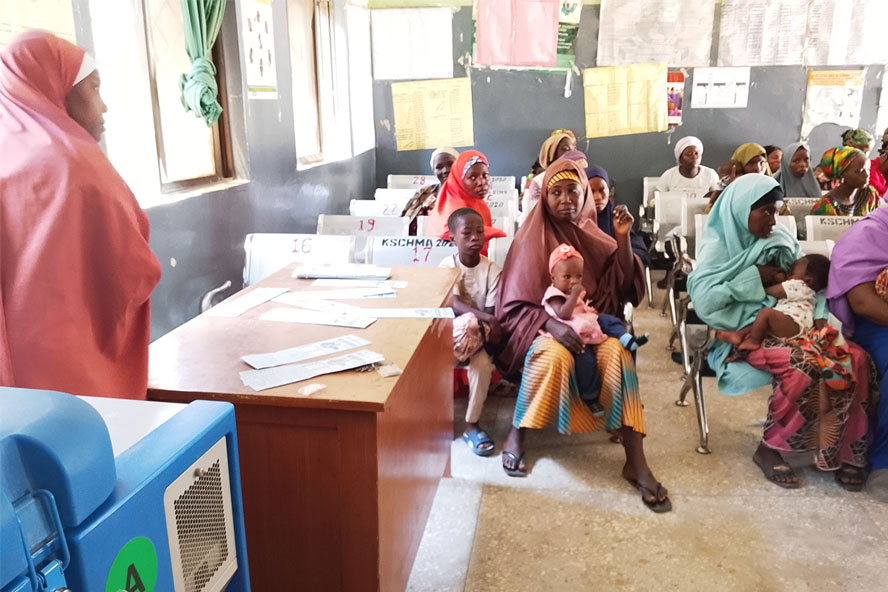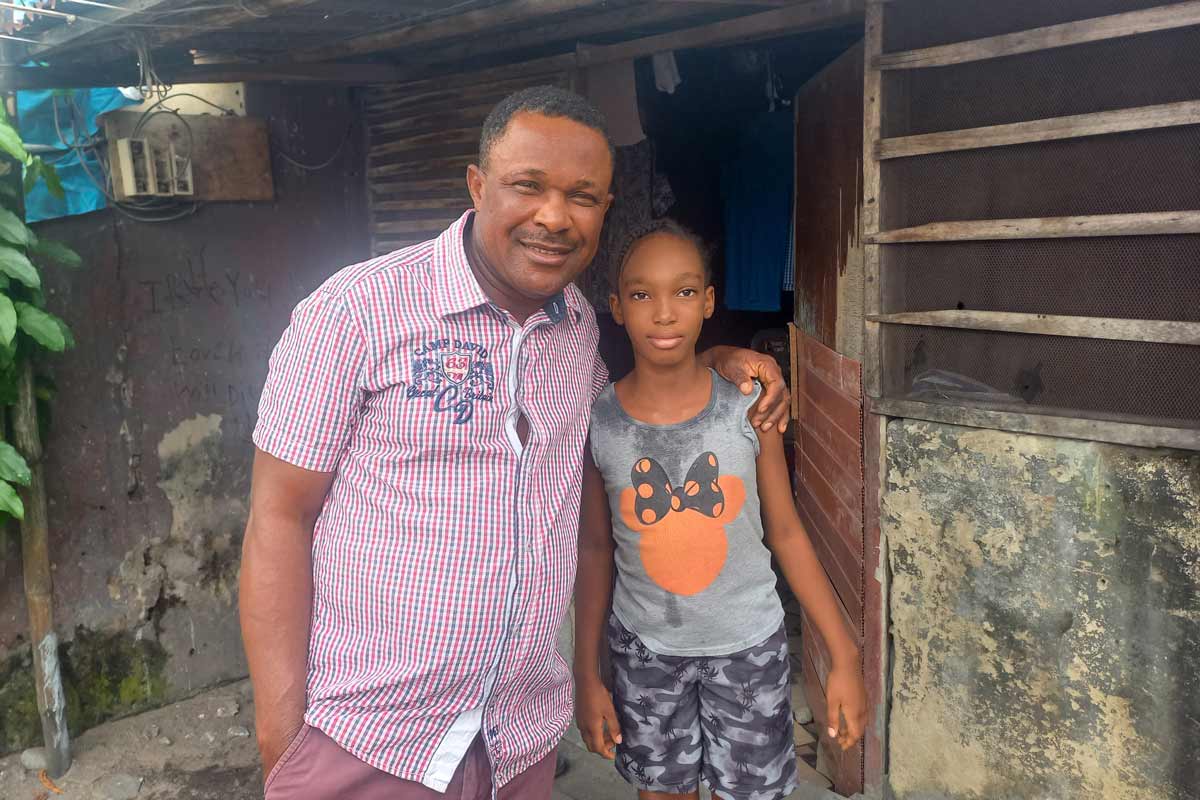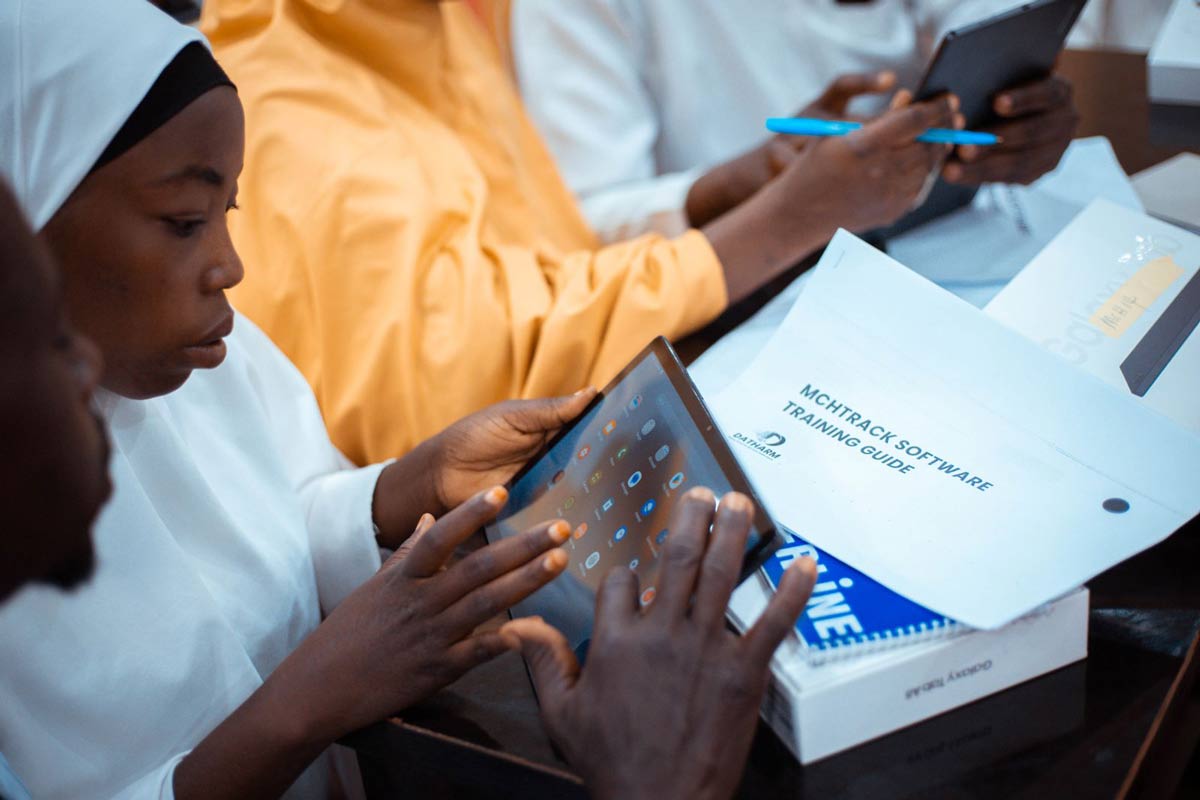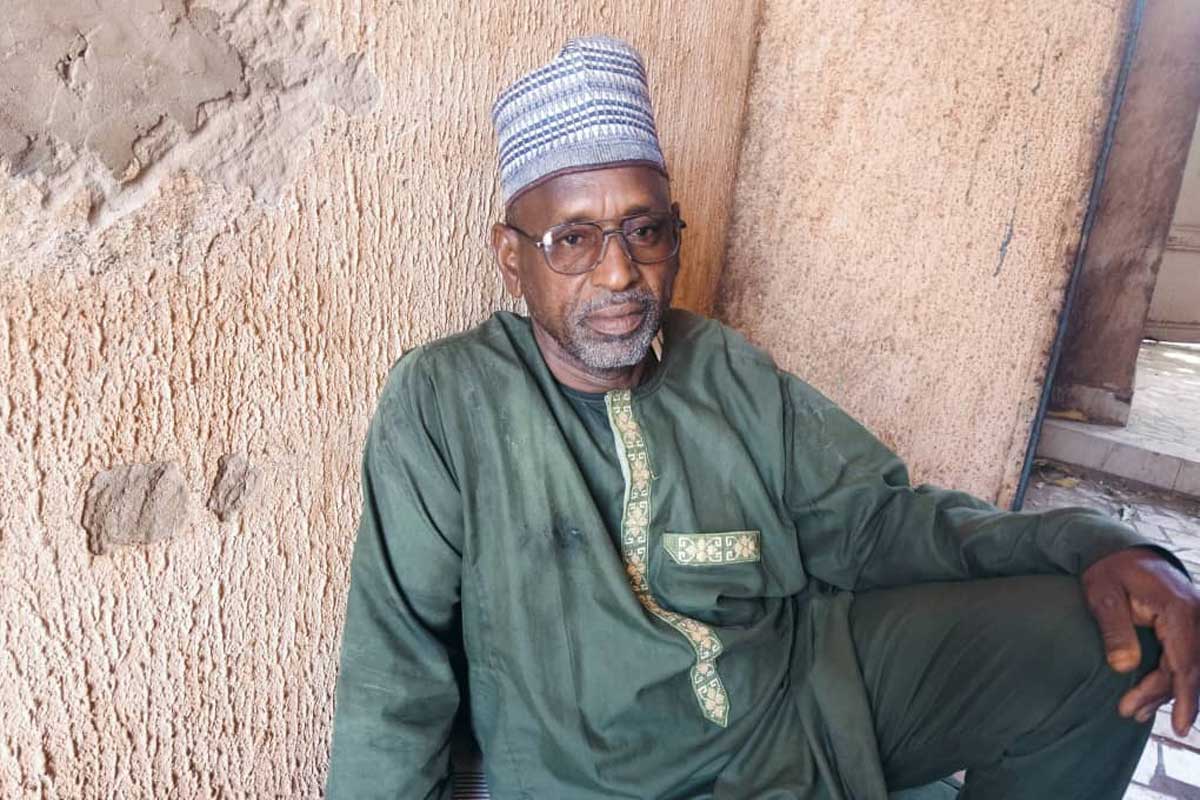How solar power revived health care for communities in rural Nigeria
A staggering 45% of Nigeria is cut off from the national electricity grid but after installing a solar power rig Idon Rural Hospital is no longer in the dark.
- 16 October 2023
- 9 min read
- by Afeez Bolaji
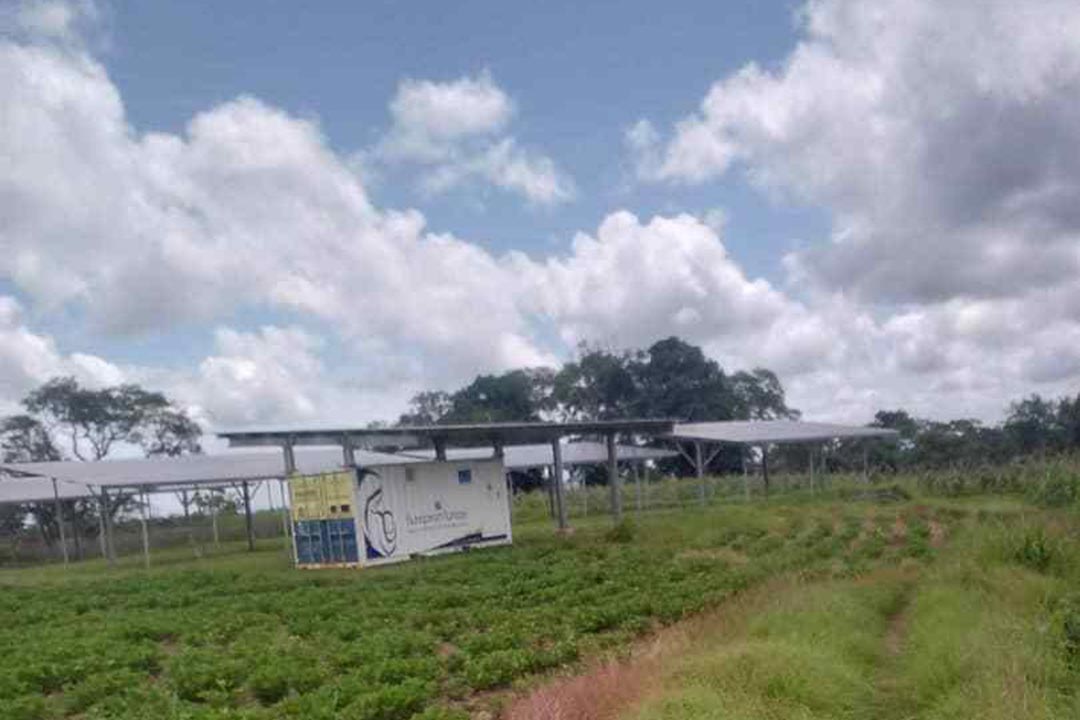
In a corner of a hallway of Idon Rural Hospital in Kaduna State, northwest Nigeria, Victoria Likita tried to pacify her six-week-old baby. The child had just received two of her first jabs: a dose of the pentavalent vaccine, and the Bacillus Calmette Guerin (BCG) immunisation against tuberculosis.
It was 10:30 on a Wednesday morning in late September and Likita, a kitchen utensils retailer, was in a hurry to reunite with her customers at Idon Market Square after more than a month on maternity break.
"We now vaccinate an average of 50 children per week compared to less than 20 when we had power issues."
– Nurse Gladys Yakasai
"I ought to have brought her for BCG before now, but I live in Aduma, which is ten kilometres away. I just resumed business today and since the marketplace is not far from here, I left my wares and quickly brought my baby for immunisation," she said.
Market day is when most women like Likita, who reside far from the health centre, bring their children for routine immunisation or attend antenatal sessions, Gladys Yakasai, a nurse, said. Indeed, the hospital bubbled with activity. Along corridors, pregnant women, nursing mothers and other outpatients sat in rows in exchanging pleasantries as they waited to be called into the wards.
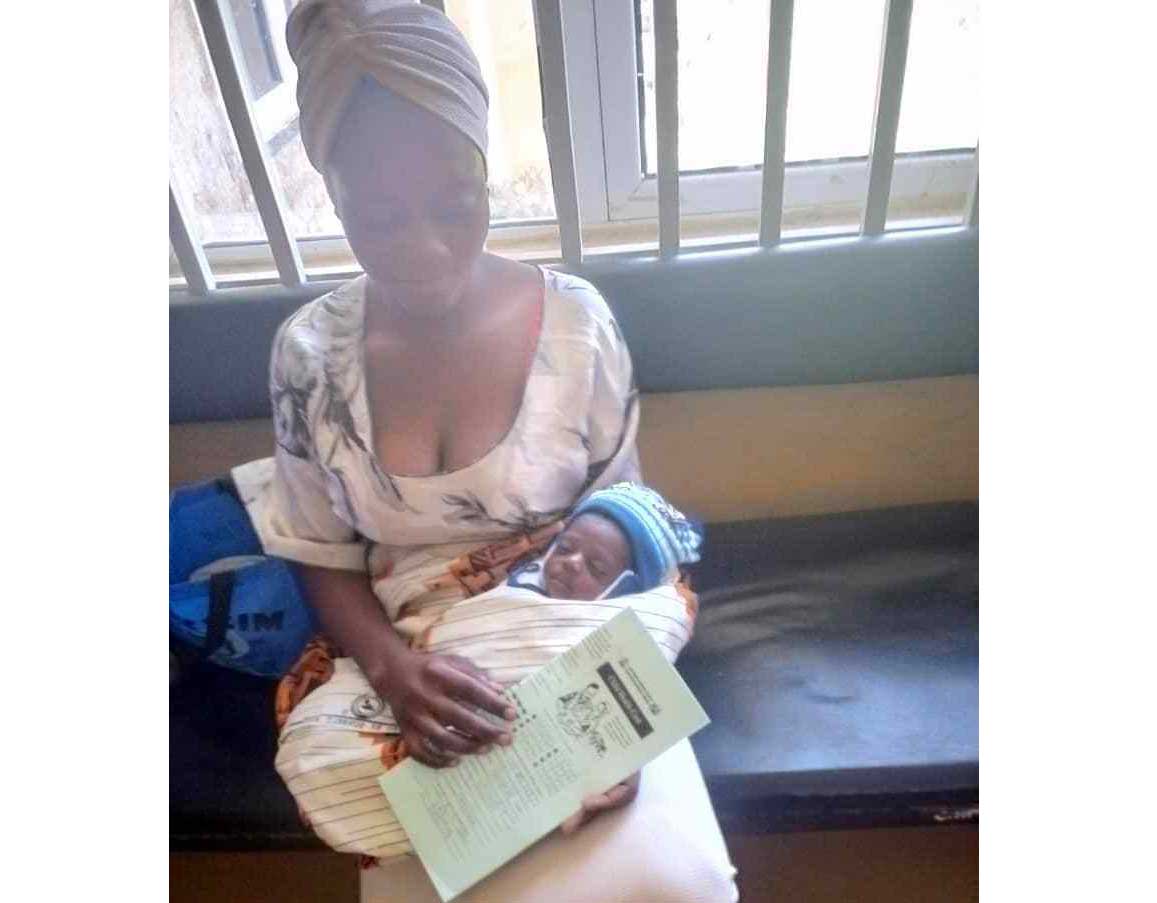
Credit: Afeez Bolaji
"They are mostly traders. If you give them an appointment other than Wednesday, which is their market day, many of them would not come. So we receive a lot of patients on market day and they are always in a hurry to go back. The good thing is we are able to attend to all of them," said Yakasai.
Solar revolution
That wasn't always true. The nurse recalled that until three years ago, when a 47.5KvA microgrid – a large energy storage container fed by an array of solar panels – was installed on the hospital premises, poor power supply crippled critical services including immunisation, maternal care and emergency response. She said cases that should have been treated were referred to health centres 30 to 100 kilometres away, due to outages.
"I didn’t give birth to my first child here, because the service was poor then. That was four years ago. There were times I would bring her for immunisation and they would tell me some officials had gone to Kachia General Hospital, which is about 30km from here, to bring vaccines. Many of us would eventually leave especially if it was on a market day."
– Mary Godwin, mother
"In those years, we were afraid to admit pregnant women in labour and patients in emergency conditions, because we barely had electricity to power hospital equipment and our [fossil fuel-powered] generator was unreliable. But since the solar system was installed in 2020, we have been having power supply round-the-clock, and it aids service delivery perfectly, especially when we have emergency cases at night. We now handle two to three childbirths every week and sometimes it could be more. We can also now treat accident victims and serious cases of diarrhoea, malaria and typhoid, among others.
"The solar energy also enables us to store vaccines at appropriate degrees [temperatures] and administer immunisation regularly. We now vaccinate an average of 50 children per week compared to less than 20 when we had power issues. Aside from routine immunisation, a lot of people come for COVID-19 vaccination. We would not have been able to render these services without stable power. In fact, vaccines used to get spoiled in our freezers," she said.
Though Godiya Aboibarho joined the hospital barely two years ago as head of the immunisation unit, she could easily imagine how power failure would have blocked access to crucial routine health care for many people.
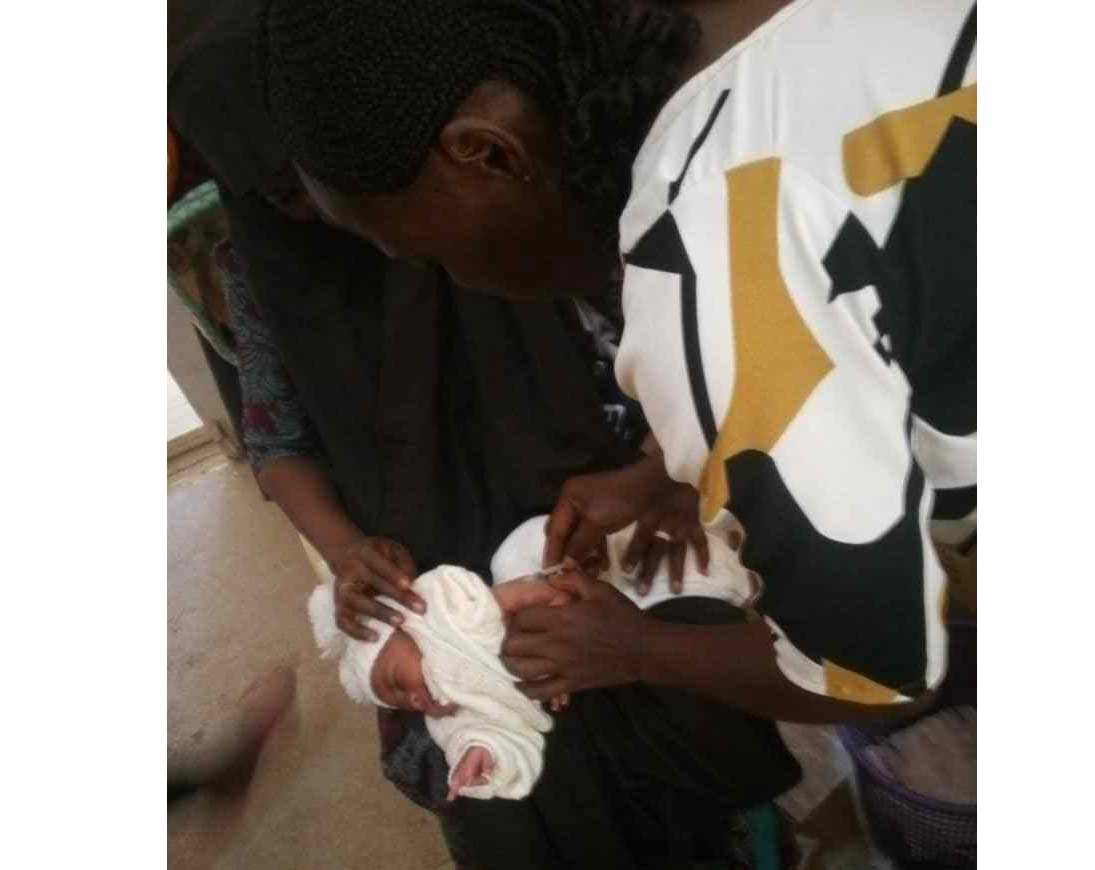
Credit: Afeez Bolaji
"I was not here before it was installed, but I was told how terrible things were. People come for vaccination every day, but we have more turnouts on market day. About 38 nursing mothers brought their children for immunisation today, [September 27] while 25 pregnant women came for antenatal care."
The new solar array has been transformative – but that doesn't mean all of the health centre's problems have been solved. "We have challenges in carrying out regular immunisation outreach due to transportation logistics. We hope it will be addressed soon. It is only during special campaigns that we are mobilised and the last one was in July when we visited seven communities," she explained.
Out of the dark
Oil-rich Nigeria is in an energy crisis. Ninety million people in the country – 45% of the population – don't have access to grid electricity, making in the country with largest absolute energy deficit in the world.
Have you read?
Most of those 90 million people are in rural areas like Idon and its adjoining villages. Living in the dark is a hardship for every sphere – but health care is among the worst hit.
"In areas plagued by inadequate power supply from the national grid, health care facilities – especially in rural Kaduna – were forced to perform essential medical procedures by the dim light of candles, putting lives at risk," Mohammed Shehu, the Chief Press Secretary to Kaduna State governor admitted, adding that the Kaduna Solar for Health Programme was established to solve the problem.
"The programme's objective is to upgrade at least one PHC [primary health care centre] in every ward with solar energy to international standards, ensuring round-the-clock access to quality health care within 2km for every Kaduna resident. The Kaduna State Government has successfully provided 24-hour sustainable solar energy solutions to health centres and hospitals across the state, through collaborative efforts between the state's health and power sectors as well as support from development partners, including the United Kingdom Department for International Development and the European Union.
"The Kaduna Power Supply Company [KAPSCO] plays a pivotal role in implementing and sustaining the Kaduna Solar for Health Programme. KAPSCO's commitment ensures the maintenance and sustainability of these solar power installations, which have already benefitted 100 communities, by installing about 2MW (2000KVA) of solar power in PHCs and general hospitals, greatly enhancing the health care environment," he said.
Shehu explained that the programme will unfurl in three phases. Phases 1 and 2 were completed in 2017 and 2020, empowering 34 PHCs with a combined 1.7MW solar power and 13 other hospitals – including Idon Rural Hospital – with a total of 0.8MW capacity respectively.
"Phase 3 is underway, targeting 221 PHCs with 1.3MW, all maintained by KAPSCO. This has led to increased in-patient visits, improved security and the ability to perform critical medical operations, from blood storage to surgeries, even in remote areas.
"More pregnant women are now willing to come for antenatal because they are sure of getting quality service on time. Some years back, we had to wait for hours – either because there was no fuel to power the generator or the generator was faulty."
– Stella Isuwa, mother
"State-funded health care in Kaduna aims to provide equitable access to quality and affordable health care for all residents. This includes reducing maternal and infant mortality rates. To address health care challenges, the state government has recognised that reliable power supply is essential," he added.
Locals share testimonies as more households embrace renewable energy
Mary Godwin had brought in her four-month-old son, Samuel, for the third dose of rotavirus vaccine, protective against a highly contagious diarrhoeal disease. She was among several visitors who were excited about the life-changing impact of the microgrid.
"I didn't give birth to my first child here, because the service was poor then. That was four years ago. There were times I would bring her for immunisation and they would tell me some officials had gone to Kachia General Hospital, which is about 30km from here, to bring vaccines. Many of us would eventually leave, especially if it was on a market day.
"The situation changed when the solar power started working. She was about one year old then. I'm happy she eventually got the vaccines she missed. I gave birth to her brother (Samuel) here without any challenge and he has been receiving his immunisation regularly.
"Now many households are using small solar power sold for 30,000 naira (about US$ 40) to light bulbs at night and charge phones. My husband is also planning to get one soon," she said.
Stella Isuwa, a food vendor from Idon Hanya said that, unlike during her first two pregnancies, she is enthusiastic to attend antenatal visits at the hospital this time around.
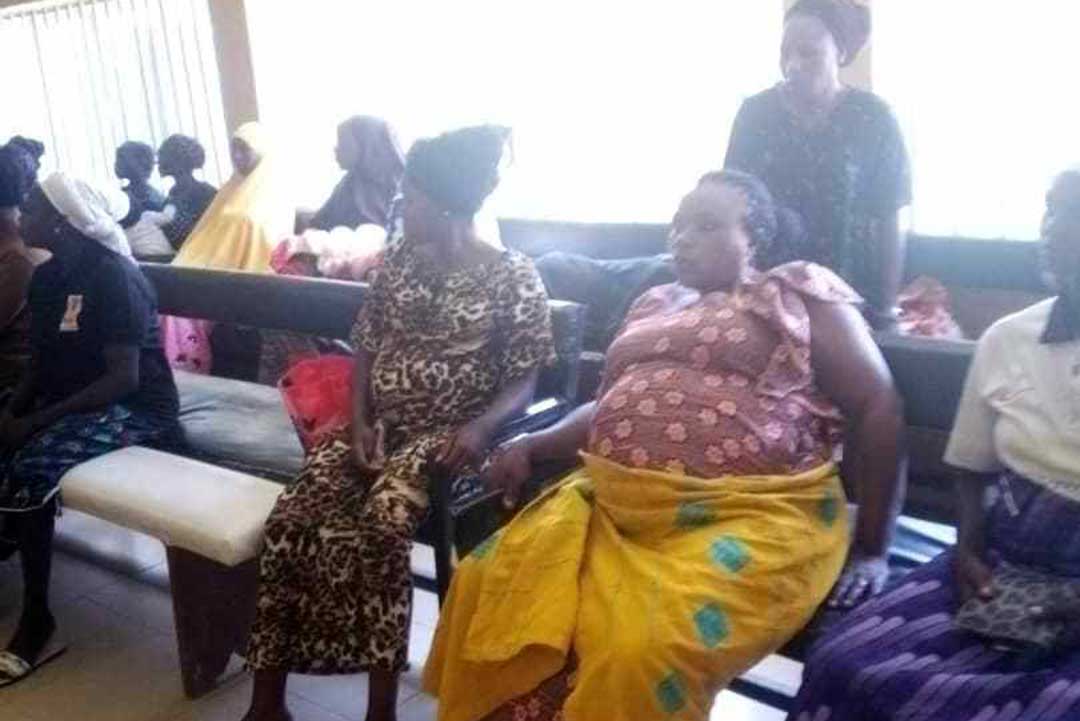
Credit: Afeez Bolaji
"The service has really improved. They have run urine, blood, sugar, hepatitis, HIV and other tests for me. They attended to me within an hour. More pregnant women are now willing to come for antenatal because they are sure of getting quality service on time. Some years back, we had to wait for hours – either because there was no fuel to power the generator or the generator was faulty," Isuwa explained.
The immediate past district head of Idon, Bitruce Ahmadu, described the microgrid as a "game changer" for Idon Rural Hospital.
"There are over 20 villages around Idon with more than 50,000 people. We all depend on this hospital, though we have dispensaries in villages. We really suffered during the years the hospital was struggling due to power failure. The solar power has reduced referral drastically at the hospital, unlike before when they referred minor cases. Now, they only refer when the case is too complex for them to handle," he said.
Ahmadu lamented that the ongoing outages faced in the region plunge homes into darkness for two to three days at a time, and when power is restored, it only lasts about six hours. He said the situation has led to an uptake in solar energy in the communities.
"We have complained several times, and the electricity distribution company promised to do something about it. Perhaps we will engage them further when a new district head comes on board. We have solar-powered streetlights, and more households are using solar energy they can afford. I bought mine for 250,000 naira [US$ 530 as of time of purchase in 2022] and paid in instalments over a year. It can power a television set, a fan, two bulbs and charge phones. Other people are using smaller capacities that can charge phones and light two bulbs," he explained.
“There are over 20 villages around Idon with more than 50,000 people. We all depend on this hospital, though we have dispensaries in villages. We really suffered during the years the hospital was struggling due to power failure."
– Bitruce Ahmadu, former district head of Idon
A woman leader and former member of the Idon Rural Hospital committee, Felicia Dangiwa, stated that the microgrid has brought great relief to the communities that have been battling insecurity for years. She added the hospital closed at dusk for fear of being attacked by bandits at night due to blackout.
"Since three years ago when solar power has been working, it has been operating at night because its surroundings are always well lit. Though the health workers still entertain some fear, they feel secure to an extent," she said.
